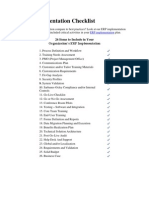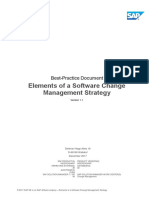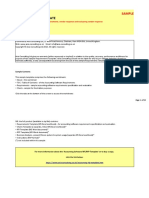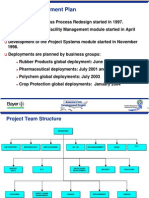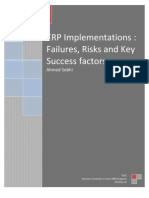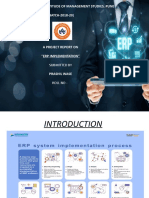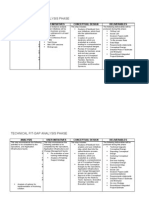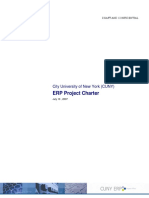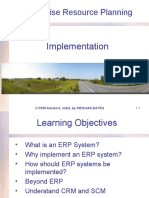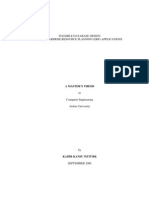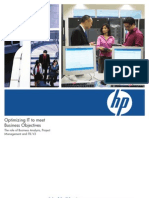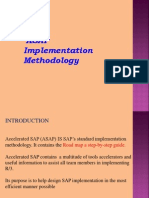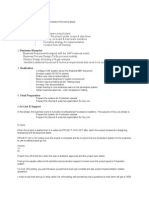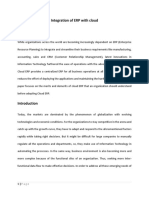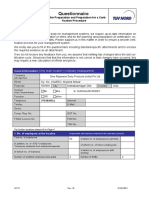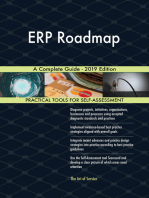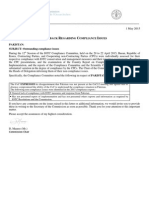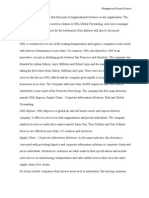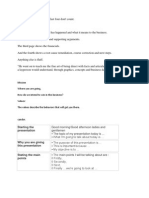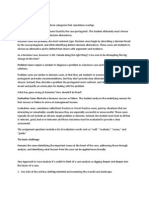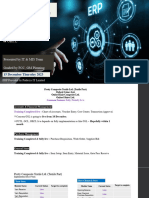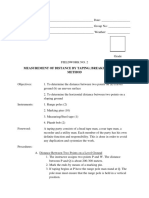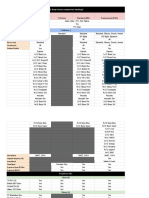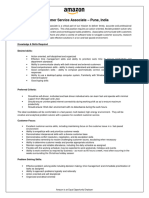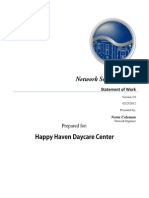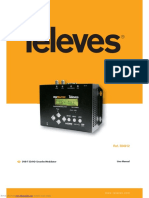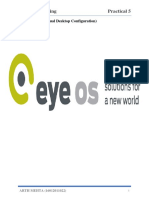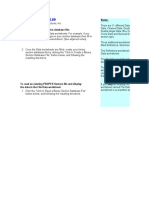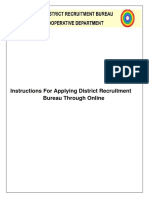(ERP) Enterprise Resource Planning - Questionaire
(ERP) Enterprise Resource Planning - Questionaire
Uploaded by
Naushad Anwar SiddiqiCopyright:
Available Formats
(ERP) Enterprise Resource Planning - Questionaire
(ERP) Enterprise Resource Planning - Questionaire
Uploaded by
Naushad Anwar SiddiqiOriginal Title
Copyright
Available Formats
Share this document
Did you find this document useful?
Is this content inappropriate?
Copyright:
Available Formats
(ERP) Enterprise Resource Planning - Questionaire
(ERP) Enterprise Resource Planning - Questionaire
Uploaded by
Naushad Anwar SiddiqiCopyright:
Available Formats
Hi all, I am a final year master student in Turkey and right now doing a survey which title is "Effects of Top
management in the success of ERP systems". I have prepared a questionnaire which basically focuses on the ERP issues and management problems faced in ERP systems. Based on the survey i will be able to draw a conclusion. Anyone interested with ERP can answer this questionnaire. Please spare a few minutes to fill in the questionnaire and send it back to my e-mail adress: ERPanket_cevap3@yahoo.com It would be very helpful for my study. I would also like to thank you all very much for your time and help in advance. Note: Please forward this mesage to the people who may interest ERP. By this way we can get more accurate results from survey Regards, Alper
(ERP) Enterprise Resource Planning - Questionaire
Questions: 1- Please specify the country your organization to be found: 2- Your sex: (a) Male (b) Female 3- Your educational background (a) Less than high school diploma (b) High school diploma (c) Bachelors degree (d) Masters degree (e) Doctorate 4- what is your primary jop function? (a)Corporate/Administrative Management (b)Project/Program Managemet (c)Consulting Your answer: (Please specify) Your answer: (Please use "X")
Your answer: (Please use "X")
Your answer: (Please use "X")
(d)Engineering (e)Time Management/Scheduling/planning (f) Other, Specify: 5- With what type of firm or organization do you work? (a) Construction/Pruduction (please specify in which area of it): (b) Service (please specify in which area of it): 6- How many years has your company been in business? (by years) 7- How many years of working experience do you have? (by years) 8- Do you currently use an ERP System? (if your answer is no than continue from Question-10) 9- If your answer is yes, specific your ERP Technology used for Systems Integration: Check all relevant systems SAP PeopleSoft BAAN Oracle JD Edwards Vitria See-Beyond Iona i2 Attunity Other (Please specify):
Your answer: (Please use "X")
Your answer: (Please use "X") Yes No Your answer: (Please use "X")
Your answer: (Please use "X") Disagree 10- How far do you agree or disagree to the view that "ERP systems increases the success of management" Strongly Disagree Strongly Agree Neutral Agree
11- ERP applications provide several benefits. Some of them are listed below. Please rank Your answer : (please give each of them each of them according to their importance in your mind between (1-5) least important (score a score between (1-5)) of 1) and most important (score of 5)
(a) (b) (c) (d) (e) (f) (g) (h) (i) (j) (k) (l) (m) (n) (o)
Reconciles and optimizes the conflicting goals of different divisions or departments Increases efficiencies by standardizing business processes On-line/real time information throughout all the functional areas of an organization Data standardization and accuracy across the enterprise. The analysis and reporting that can be used for long term planning. Reduces enterprise expenses Reduces paper works Early risk resolution, early error and gap detection Increases adaptability to changing work conditions Reduces inventories, personel, total logistic costs, manufacturing costs, outside warehausing, procurement costs Managers needs right information at right time as fast as possible so that they can predict trends, budgets and keep top management informed well in advance. Top management needs system so that they can dig out information on their own without any dependency on managers or employees. This will eventually make your hierarchical organization look flat Increases customer satisfaction Improves decision-making capabilities Increases production capacity Your answer : (please give each of them a score between (1-5))
12- Some managerial problems frequently faced during and after ERP implementation are listed belove. Please rank each of the following problems according to their importance between (1-5) least important (score of 1) and most important (score of 5) (a) Project Cost Overruns (b) Project Delays (c) Conflicts with business strategy (d) Employees Resistance to Change (e) Conflicts with Consultants (f) Internal Conflicts (g) Conflicts with Vendors 13- At which proportion you realized your expectations about system improvement through your ERP implementation 80%-100% (Exactly) 70%-80% (Near exactly) 60%-70% (Over Medium)
Your answer: (Please use "X")
50%-60% (Partially) 40%-50% (Under medium) 30%-40% (Little) 0%-30% (Very little) 14- Please rate the followig critical factors required for a successful ERP implementation according to their importance in your mind between (1-5) least important (score of 1) and most important (score of 5) (a) Top management support (b) Project team competence (c) Interdepartmental cooperation (d) Clear goals and objectives (e) Project management (f) Interdepartmental communication (g) Project champion (h) Vendor support (i) Careful package selection (j) Data analysis & conversion (k) Allocation of resources (l) Use of steering committee (m) User training on software (n) Education on new business processes (o) Business Process Reengineering (p) Change management 15- Some managerial behaviours which can affect the success of an ERP implementation are given below. Please specify, how far do you agree or disagree that these statements posibility to affect the success of an ERP system and make clear if you have faced any of them before in your organization. Managers can keep away from otomation projects and prefer manuel systems because of their unsuccessful project experiences Managers who have confidence in their positions and informal relations can have a fear if (b) ERP prevents their political forces (c) Sometimes taken project decisions can not be transmit all relevant sections (a)
Your answer : (please give each of them a score between (1-5))
Your answer: (Please use "X") Disagree Strongly Disagree Strongly Agree Neutral Agree
Your answer: if you have faced like a situation please specify by using "X" (you can choose more than one)
(d) (e) (f) (g) (h) (i) (j) (k) (l)
Project Cost Overruns and insufficiency of budget can causes management avoidance from ERP Sometimes top management can not supply adequate support to project managent Sometimes top management can not support educational trainings related with system which have to be considered to set up Sometimes during project implementation stage top management can not be informed adequately by project team Sometimes it can be prevet that top and middle managers be a project team leader Sometimes project plans can be far from reality Sometimes lack of communication can be appear between information system personel and management Sometimes top management keep away from being a part of change project via not visiting the departments to control ERP implementation stage Sometimes training possibilities can not be enough to support technology changes in the organization
You might also like
- Activate MethodologyDocument4 pagesActivate MethodologymanukondaNo ratings yet
- SAP Change ManagementDocument1 pageSAP Change ManagementPranav VyavahareNo ratings yet
- ERP Implementation ChecklistDocument13 pagesERP Implementation ChecklistJim DrummNo ratings yet
- 1355 V11 201502 BestPractices SoftwareChangeManagement V4eDocument37 pages1355 V11 201502 BestPractices SoftwareChangeManagement V4eroysapuNo ratings yet
- Instantly - Ai - Cold Email Optimization GuideDocument16 pagesInstantly - Ai - Cold Email Optimization GuideDovlaNo ratings yet
- SAP S/4HANA Project System & Investment Management Online TrainingDocument14 pagesSAP S/4HANA Project System & Investment Management Online TrainingMamta100% (1)
- Final Questionnaire For ERPDocument3 pagesFinal Questionnaire For ERPTanmay Sh100% (2)
- Requirement Gathering QuestionarreDocument83 pagesRequirement Gathering QuestionarreMuhammad Asif QureshiNo ratings yet
- ERP RolloutDocument11 pagesERP Rolloutsam100% (6)
- ERP ChecklistDocument29 pagesERP Checklistbdronok2009100% (1)
- ERP FailuresDocument14 pagesERP FailuresAhmed SobhiNo ratings yet
- (BATCH-2018-20) : Chetan Dattaji Gaikwad Institude of Management Studies, PuneDocument8 pages(BATCH-2018-20) : Chetan Dattaji Gaikwad Institude of Management Studies, PuneRubina MansooriNo ratings yet
- Scope RDSDocument18 pagesScope RDSsanjeevr811No ratings yet
- Enterprise Resource Planning (ERP) : Presented By: Makansingh ChauhanDocument28 pagesEnterprise Resource Planning (ERP) : Presented By: Makansingh ChauhanGuru Darshan0% (1)
- QuestionnaireDocument135 pagesQuestionnairevarunprathi0% (1)
- ERP Change ManagementDocument10 pagesERP Change ManagementSajid SidNo ratings yet
- ERP PlanningDocument25 pagesERP Planningmanoj vermaNo ratings yet
- Modern Erp 2022Document14 pagesModern Erp 2022Murtuza SadikotNo ratings yet
- Section 2 - Chapter 7 - ERP Project MGMT - Teaching AidDocument14 pagesSection 2 - Chapter 7 - ERP Project MGMT - Teaching Aidbhartesh pandeyNo ratings yet
- ERP Software RFP Outline PDFDocument12 pagesERP Software RFP Outline PDFlavanda 2No ratings yet
- Faqs From Sap Customers: InsideDocument6 pagesFaqs From Sap Customers: Insidesearch_infoNo ratings yet
- SAP Project ManagerDocument6 pagesSAP Project ManagerErpSapNo ratings yet
- Project PlanDocument6 pagesProject PlanShah MietyNo ratings yet
- Functional Fit-Gap Analysis PhaseDocument2 pagesFunctional Fit-Gap Analysis PhaseKiran Reddy0% (1)
- Erp Project Charter 1Document35 pagesErp Project Charter 1Jonathan MarínNo ratings yet
- Exam QuestionsDocument13 pagesExam Questionsgauravgd16No ratings yet
- Master of Business AdministrationDocument8 pagesMaster of Business AdministrationIzwanNy AhmadNo ratings yet
- Enterprise Resource Planning: ImplementationDocument83 pagesEnterprise Resource Planning: ImplementationBsnu Shrestha100% (1)
- 9622 3 ERP Architecture IntroDocument42 pages9622 3 ERP Architecture IntroGitanjali SinghNo ratings yet
- SAP ERP Implementation CommercialDocument12 pagesSAP ERP Implementation CommercialAna PetekNo ratings yet
- ERPDocument89 pagesERPJack AbdallahNo ratings yet
- Optimizing IT To Meet Business Objectives: The Role of Business Analysis, Project Management and ITIL V3Document12 pagesOptimizing IT To Meet Business Objectives: The Role of Business Analysis, Project Management and ITIL V3rohit1999No ratings yet
- ASAP - SAP Project RoadmapDocument10 pagesASAP - SAP Project RoadmapmastersaphrNo ratings yet
- Asap ImplementationDocument17 pagesAsap Implementationjustavneet100% (1)
- SAP Personas TemplateDocument6 pagesSAP Personas TemplateCallum BromleyNo ratings yet
- ASAP Methodology - 1st Phase - Project PreparationDocument38 pagesASAP Methodology - 1st Phase - Project Preparationbdkumar_684437085100% (3)
- What Are Functional Specification in SAPDocument1 pageWhat Are Functional Specification in SAPRaman MallelaNo ratings yet
- Sikkim Manipal University: "A Study On The Critical Suceess Factors of Erp Life Cycle Implementation at Gorana Group"Document18 pagesSikkim Manipal University: "A Study On The Critical Suceess Factors of Erp Life Cycle Implementation at Gorana Group"AnjaliNo ratings yet
- S4H - 399 Onboarding PresentationDocument63 pagesS4H - 399 Onboarding PresentationTiago Ferreira MendesNo ratings yet
- Peoplesoft Financials ImplementationDocument11 pagesPeoplesoft Financials ImplementationKesava Sumanth ANo ratings yet
- Preparing For ERP Implementation PDFDocument64 pagesPreparing For ERP Implementation PDFSayandeep Mitra100% (1)
- SAP OverviewDocument34 pagesSAP Overviewนพ บีเคเค100% (2)
- Integration of ERP With CloudDocument13 pagesIntegration of ERP With CloudarpritNo ratings yet
- Are You Prepared For The Data Migration Challenge?: Golive With No Business DisruptionDocument4 pagesAre You Prepared For The Data Migration Challenge?: Golive With No Business DisruptionRamesh Ganapathi100% (1)
- SAP IS Blue Print DocumentDocument4 pagesSAP IS Blue Print DocumentSupriyo DuttaNo ratings yet
- Oracle Fusion Governance, Risk, and ComplianceDocument2 pagesOracle Fusion Governance, Risk, and Compliancemarinas80No ratings yet
- Sap BudgetDocument4 pagesSap BudgetRajuSPallapuNo ratings yet
- Auditing SAP R3 - Control Risk AssessmentDocument28 pagesAuditing SAP R3 - Control Risk AssessmentDarleza ZefriNo ratings yet
- Oracle ERP Implementation Project Excution PlanDocument4 pagesOracle ERP Implementation Project Excution PlanalbagirshareifNo ratings yet
- ERP Selection Checklist - ERP FocusDocument3 pagesERP Selection Checklist - ERP FocusDennis NebekerNo ratings yet
- Hidden Costs of Erp ImplementationDocument9 pagesHidden Costs of Erp ImplementationSubhashBaindhaNo ratings yet
- BCA - ICAI GRC Approach SAP PDFDocument33 pagesBCA - ICAI GRC Approach SAP PDFsarvjeet_kaushalNo ratings yet
- ERP Fit Gap AnalysisDocument20 pagesERP Fit Gap Analysiskarimmebs100% (1)
- Functional Specification - Document Overview: Document Required Information CommentsDocument15 pagesFunctional Specification - Document Overview: Document Required Information CommentsNoelsundeep MuraryNo ratings yet
- Project PPT On Erp FinalDocument47 pagesProject PPT On Erp Finalprabhleen_kaur29No ratings yet
- QF 01 Rev18 Questionaire For Offer Preparation Updated - 637796734931738402Document6 pagesQF 01 Rev18 Questionaire For Offer Preparation Updated - 637796734931738402Santosh Kumar KurellaNo ratings yet
- Sap Fieldglass Contingent: Find Superior Contingent Workers Faster, Ensure Compliance and Gain Total VisibilityDocument2 pagesSap Fieldglass Contingent: Find Superior Contingent Workers Faster, Ensure Compliance and Gain Total VisibilitynaguficoNo ratings yet
- DQT Project Charter - FinalDocument13 pagesDQT Project Charter - Finaljeffh176No ratings yet
- Public Cloud ERP for Small or Midsize Businesses A Complete Guide - 2019 EditionFrom EverandPublic Cloud ERP for Small or Midsize Businesses A Complete Guide - 2019 EditionNo ratings yet
- Mechanism To Ensure Merit Based RecruitmentDocument2 pagesMechanism To Ensure Merit Based RecruitmentNaushad Anwar SiddiqiNo ratings yet
- Letter of Feedback-PakistanDocument1 pageLetter of Feedback-PakistanNaushad Anwar SiddiqiNo ratings yet
- DHL 1Document17 pagesDHL 1Naushad Anwar SiddiqiNo ratings yet
- Assertiveness and NonassertivenessDocument5 pagesAssertiveness and NonassertivenessNaushad Anwar SiddiqiNo ratings yet
- Mission Where You Are Going, How Do We Intend To Win in This Business? Values: The Values Describe The Behaviors That Will Get You ThereDocument2 pagesMission Where You Are Going, How Do We Intend To Win in This Business? Values: The Values Describe The Behaviors That Will Get You ThereNaushad Anwar SiddiqiNo ratings yet
- Case AnalysisDocument3 pagesCase AnalysisNaushad Anwar SiddiqiNo ratings yet
- Buyers Customerrols Bargaining PowerDocument3 pagesBuyers Customerrols Bargaining PowerNaushad Anwar SiddiqiNo ratings yet
- Brief History of Bank Alfalah LimitedDocument22 pagesBrief History of Bank Alfalah LimitedMd.Tareq HasanNo ratings yet
- DS Electra XOSDocument3 pagesDS Electra XOSnn noorNo ratings yet
- Mutual Fund Back Office System: Solutions For ExcellenceDocument4 pagesMutual Fund Back Office System: Solutions For ExcellenceAchyut GoreNo ratings yet
- Presentation On ERP ImplementationDocument11 pagesPresentation On ERP ImplementationShafin RockerNo ratings yet
- Dalet Workflow Engine PDFDocument1 pageDalet Workflow Engine PDFJackSteakleyNo ratings yet
- History of AIDocument1 pageHistory of AISandro CafagnaNo ratings yet
- Magellan Solar Gate Email Size PDFDocument8 pagesMagellan Solar Gate Email Size PDFbacuoc.nguyen356No ratings yet
- PL 900Document30 pagesPL 900debu maity100% (1)
- Microprocessors and Microcontrollers LAB: Aditya Engineering College (A)Document36 pagesMicroprocessors and Microcontrollers LAB: Aditya Engineering College (A)Sowmya ChowdaryNo ratings yet
- Clib Howto v13Document11 pagesClib Howto v13mail87523No ratings yet
- Measurement of Distance by Taping Breaking The Tape MethodDocument6 pagesMeasurement of Distance by Taping Breaking The Tape MethodRey ApiladoNo ratings yet
- BIAS Amp Product ChartDocument4 pagesBIAS Amp Product ChartMarco ZamoranoNo ratings yet
- JD-Customer Service-Amazon IndiaDocument3 pagesJD-Customer Service-Amazon Indiarkk649669No ratings yet
- Detect and Eliminate Damaging Memory Leaks With ABAP Memory InspectorDocument2 pagesDetect and Eliminate Damaging Memory Leaks With ABAP Memory InspectorRam PraneethNo ratings yet
- Filetype Filetype PDFDocument2 pagesFiletype Filetype PDFAlex67% (3)
- Discrete Probability DistributionsDocument52 pagesDiscrete Probability DistributionsCiel CelizNo ratings yet
- Marconi LH MDRS 155 EC - System Description 19.06.2006Document60 pagesMarconi LH MDRS 155 EC - System Description 19.06.2006AyrDoCoutoBahia100% (2)
- HappyHavenDayCareCenter NetworkDesignProposal2Document0 pagesHappyHavenDayCareCenter NetworkDesignProposal2alvabarreraNo ratings yet
- User Manual DVB-T SD/HD Encoder/Modulator: Downloaded From Manuals Search EngineDocument16 pagesUser Manual DVB-T SD/HD Encoder/Modulator: Downloaded From Manuals Search EngineOsama ZiadiNo ratings yet
- Worksheet Works Alphabet Maze 18Document3 pagesWorksheet Works Alphabet Maze 18Fatma SözgenNo ratings yet
- Ethical Hacking Guide-Esy UnderstandingDocument250 pagesEthical Hacking Guide-Esy Understandingneoalt100% (1)
- EyeOS (Cloud Computing)Document22 pagesEyeOS (Cloud Computing)nikitaNo ratings yet
- Cryptography Data Encryption: Bhaskar Kakulavarapu ISACA-Detroit ChapterDocument33 pagesCryptography Data Encryption: Bhaskar Kakulavarapu ISACA-Detroit ChapterDBNo ratings yet
- PROPER Version 8.00: NotesDocument180 pagesPROPER Version 8.00: NotesAlfredo DottaviNo ratings yet
- Starfinder FieldTest 5Document9 pagesStarfinder FieldTest 5Ricardo DuarteNo ratings yet
- Instructions For Applying District Recruitment Bureau Through OnlineDocument23 pagesInstructions For Applying District Recruitment Bureau Through OnlineKayalNo ratings yet
- Toc Unit IDocument20 pagesToc Unit IanilostaNo ratings yet
- Manual Modflow 6 251 292Document42 pagesManual Modflow 6 251 292cerbero perroNo ratings yet
- Biscast New Students - Online Enrollment ProceduresDocument6 pagesBiscast New Students - Online Enrollment ProceduresKjNo ratings yet
- Prerequisites For Diesel Generator DG Set InstallationsDocument6 pagesPrerequisites For Diesel Generator DG Set InstallationsTagel MarkosNo ratings yet


